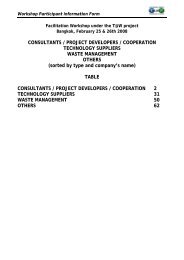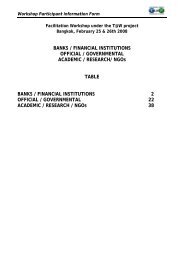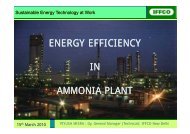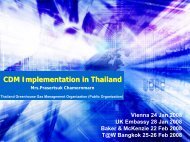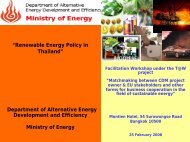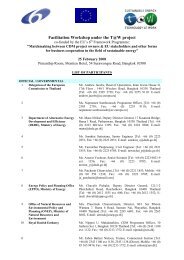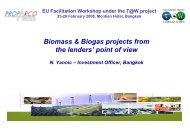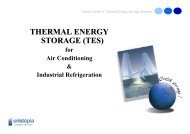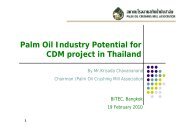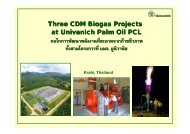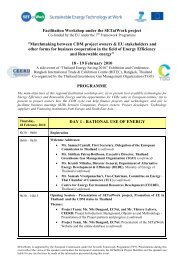Malaysia - SETatWork - Sustainable Energy Technology at Work
Malaysia - SETatWork - Sustainable Energy Technology at Work
Malaysia - SETatWork - Sustainable Energy Technology at Work
Create successful ePaper yourself
Turn your PDF publications into a flip-book with our unique Google optimized e-Paper software.
1.1 <strong>Malaysia</strong> <strong>Energy</strong> Policy<br />
<strong>Energy</strong> has contributed significantly towards the rapid growth of the <strong>Malaysia</strong>n economy.<br />
Today, about 80% of <strong>Malaysia</strong>’s total popul<strong>at</strong>ion lives in Peninsular <strong>Malaysia</strong>, the hub of<br />
the country’s economic activities. As <strong>Malaysia</strong> progresses towards becoming a developed<br />
country, energy consumption will correspondingly increase. In meeting increasing energy<br />
demand, concerted efforts have been undertaken to ensure gre<strong>at</strong>er security and<br />
sustainability of energy supply. Consumption of energy however produces some<br />
undesirable impacts on the environment and clim<strong>at</strong>e. Hence, sustainable use of energy is<br />
being given <strong>at</strong>tention in <strong>Malaysia</strong>.<br />
<strong>Malaysia</strong> energy policy came in the 70’s, a time of rising crude oil prices and discovery of<br />
new oil sources in the Peninsular <strong>Malaysia</strong>. A Petroleum Development Act (PDA) was<br />
enacted in 1974 and followed by the N<strong>at</strong>ional Petroleum Policy in 1975. However, a more<br />
comprehensive n<strong>at</strong>ional policy on energy came in 1979. This N<strong>at</strong>ional <strong>Energy</strong> Policy<br />
contains three principal policy objectives to guide future energy policy sector<br />
development. They are as follows:<br />
• <strong>Energy</strong> Supply: Assurance of adequ<strong>at</strong>e energy supply through the reduction of<br />
the dependence on oil, and through the development and utilis<strong>at</strong>ion of<br />
altern<strong>at</strong>ive sources of energy.<br />
• <strong>Energy</strong> Utilis<strong>at</strong>ion: Promotion and encouragement of the efficient use of<br />
energy and the elimin<strong>at</strong>ion of wasteful and non-productive p<strong>at</strong>terns of energy<br />
consumption.<br />
• Environmental Conserv<strong>at</strong>ion: Minimis<strong>at</strong>ion of environmental degrad<strong>at</strong>ion in<br />
realising the supply and utilis<strong>at</strong>ion objectives.<br />
In rel<strong>at</strong>ion to the reliability and security of energy supply, Four-Fuel Diversific<strong>at</strong>ion Policy<br />
was introduced in 1981, focusing on four main sources of fuel, namely oil, hydro, gas<br />
and coal which was also aimed to reduce the dependency on oil in the energy<br />
consumption, particularly in the power sector. This policy is then expended in the year<br />
2005 to include renewable energy (RE) as the fifth fuel to supplement energy supply<br />
from conventional energy resources.<br />
1.2 <strong>Malaysia</strong> <strong>Energy</strong> Supply<br />
For almost 20 years, <strong>Malaysia</strong> successfully diversified its energy consumption by taking<br />
advantage of domestic energy resource endowments. <strong>Malaysia</strong> total oil reserves stood <strong>at</strong><br />
5.28 billion stock tank barrels (Bstb) (as <strong>at</strong> 1 st January 2006) with the remaining oil<br />
reserves and current n<strong>at</strong>ional oil production target of 600,000 barrels per day (bdp).<br />
2



